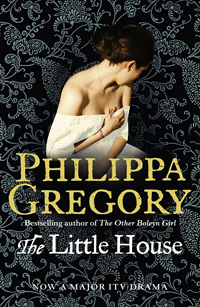You have no items in your cart. Want to get some nice things?
Go shopping Say the name “Philippa Gregory” and one immediately thinks of tightly laced corsets, the corrugated lace of magnificently decorative ruffs, cunning plots and manipulative manoeuvres in the dangerous arena of Tudor politics, thanks to her most famous novel, The Other Boleyn Girl. Yet, Philippa Gregory also proves that she is just as competent at producing a deeply engaging novel set in the 20th century as in the drama of 16th century court life with her psychological thriller The Little House, which was first published in 1998 to great success. The novel has also been recently republished with a splendid book jacket makeover due to the ITV1 drama, aired during the channel’s 2010 Autumn/Winter season.
Say the name “Philippa Gregory” and one immediately thinks of tightly laced corsets, the corrugated lace of magnificently decorative ruffs, cunning plots and manipulative manoeuvres in the dangerous arena of Tudor politics, thanks to her most famous novel, The Other Boleyn Girl. Yet, Philippa Gregory also proves that she is just as competent at producing a deeply engaging novel set in the 20th century as in the drama of 16th century court life with her psychological thriller The Little House, which was first published in 1998 to great success. The novel has also been recently republished with a splendid book jacket makeover due to the ITV1 drama, aired during the channel’s 2010 Autumn/Winter season.
The novel tells the story of Ruth, who simply adores her beautiful Bristol flat and who has great hopes for her career in radio journalism. However, her pushy husband and her in-laws eventually persuade her to give up her independent city life for the quieter and lonelier countryside. Ruth and her husband, Patrick move into Manor Cottage, the little house situated just down the lane from Patrick’s parents’ farmhouse. When Ruth falls pregnant she finds that her in-laws become increasingly meddlesome in her private affairs, to the point that she feels as if her baby isn’t even her own. Patricks’ extremely possessive parents offer their assistance, such as his mother Elizabeth making decoration decisions for the little house while Ruth “rests” (Elizabeth convinces Ruth that a biscuit-colour Berber carpet is far better than Ruth’s preference for varnished floorboards), but these “well-meaning” acts of kindness actually have more ominous undertones than one would think. The claustrophobia and the stifling closeness of Ruth’s interfering in-laws eventually reaches a startlingly eerie climax.
Gregory may have swapped the Tudor fashion trends of French hoods and farthingale skirts with contemporary clothing choices of leggings, waxed jackets and Wellington boots, but both The Other Boleyn Girl and The Little House essentially make a similar comment about the institution of the family. In both stories, there are certain self-centred and power hungry family members who are not afraid to exploit and control one another all in the supposed name of protecting or enhancing the family’s fortunes. Families are not always filled with sickly, sweet candy-floss moments, cuddly hugging and breathless giggles, but instead families are shown to be constantly in a tussle, scuffle and strained tug-of-war for power. What makes The Little House a genius creation is that Gregory shows this overzealous desire to dominate others in the family achieved through subtle and sneaky little acts, which are far more disturbing than overt and direct displays of a domineering attitude. It is the steady accumulation of quietly menacing scenarios which is the best thing about this novel. The terrific, shocking ending will completely remould the readers’ attitudes and feelings about specific characters which have been developed throughout the course of the novel.
Top marks for Philippa Gregory’s The Little House, which is a complex, sinister and suspenseful novel. The various characters’ feelings of obsession, egotism, jealousy and resentment will definitely leave readers hooked with this well constructed and clever story.

About Liz Cookman
Liz is a thoroughly London-centric writer and a recent addition to the Litro Online team. She is passionate about creative non-fiction and waffles on a lot about London and the River Wandle - a total river bore. She holds a BA in Creative Writing and is studying for an MA in Travel and Nature Writing from Bath Spa University.





This was just great for us all.